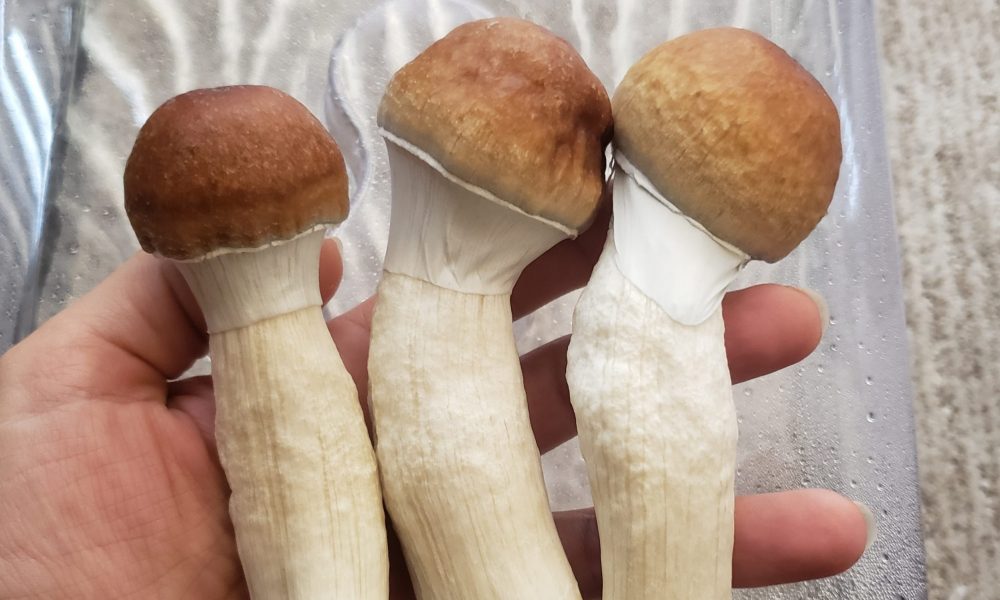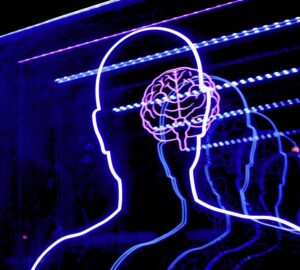New research on how people cope with challenging psychedelic experiences suggests that some ways to manage a bad trip may be more helpful than others, though the authors said their findings also indicate that there’s no one-size-fits-all approach. Thus, they advise therapists and other psychedelics facilitators to familiarize themselves with a variety of different management practices.
The paper, published in the journal Scientific Reports, is a writeup of two new studies. One looked at results of a qualitative survey of 16 people who attended multiday psychedelic retreats in the Netherlands and Mexico. That study examined how participants dealt with challenging experiences, finding their approaches generally fell into four main themes.
The other study drew from an online survey of 869 people, of which 555, or about two thirds (64.24 percent), reported having some form of challenge during their psychedelic experiences. It asked participants how they attempted to address those challenges and how effective those methods were.
Findings, the new report says, “emphasize the complex interplay between emotional experiences and coping mechanisms, highlighting the need for flexible, tailored therapeutic approaches.”
“Here we present a mixed-methods investigation into the strategies individuals employ to navigate difficult psychedelic experiences and their relationship to emotional breakthrough.”
The three-author team from University College London’s Research Department of Clinical, Educational and Health Psychology said the results indicate that while psychedelics may offer therapeutic benefits even when experiences are challenging, actually realizing those benefits depends largely on how people cope with a difficult trip.
“Our findings suggest that the paradoxical therapeutic role of challenging psychedelic experiences may depend on the type of challenge faced and the individual’s ability to employ adaptive response strategies,” they wrote.
In the first study, authors said they identified four main themes in coping, “reflecting a spectrum of cognitive, behavioural, and social response strategies”:
“The Inner Responses theme included introspective strategies such as acceptance, self-talk, interrogating the challenge, and meaning-making. The Embodied Practice and Engagement with the Environment theme emphasised physical strategies like intentional breathing, movement, and sensory engagement to manage difficult experiences. The Interpersonal Responses theme highlighted social dynamics, where participants either avoided social interactions, or alternatively sought help, or disclosed personal experiences. Lastly, the Facilitator Responses theme underscored the critical role of guides or therapists in providing physical and emotional support and introducing new elements to assist participants during challenging moments.”
Insights from the second study, meanwhile, indicated that “the emotional breakthrough during challenging experiences”—and, in turn, the likely therapeutic value of a psychedelic experience—”involve participants adopting a higher number of helpful coping strategies.”
Factors in coping strategies also aligned with the themes identified in the first study, authors wrote.
In general, “analyses revealed that strategies fostering acceptance and cognitive observation were frequently used and perceived as most effective in managing challenging psychedelic experiences,” the study says, though it adds that “some of the less frequently used strategies were also found to be substantially helpful by some individuals, suggesting a one-size-fits-all approach to managing psychedelic challenges may be inadequate.”
According to the data, respondents felt that some coping mechanisms—such as trying to let go, observing their mental processes or engaging with the natural environment—were particularly effective. Others— including consuming alcohol or another drug, directing anger or aggression at the challenging experience, trying to fall asleep or calling for spiritual help—were deemed be respondents overall as less effective.
Nevertheless, for each method included, at least some people found the practice unhelpful and at least some others rated it “substantially helpful.”
“Practically, although certain strategies may in general be more effective,” the study says says, “therapists should be well-versed in a broad spectrum of response strategies and recognise that different strategies may be more or less effective for different individuals, or specific types of challenges.”
Another notable observation was the negative impact of fear, with authors noting that “heightened fear (including experiences of panic and anxiety) was less likely to co-occur with emotional breakthrough in our sample.”
Challenging experiences involving grief or death, meanwhile, “were more commonly associated with emotional breakthrough,” they wrote.
Though further study is warranted, the report says, one possibility is that “participants in our sample who reported heightened fear-based challenges became stuck in prolonged negative feedback loops during their psychedelic use, thus inhibiting experiences of emotional breakthrough.”
“In summary,” the new paper concludes, “our findings suggest that the paradoxical positive therapeutic role of challenging psychedelic experiences may depend on the kind of challenge faced and the individual’s ability to employ adaptive response strategies.”
It encourages further research into the explanatory mechanisms behind the observed associations, which it says could improve both safety and efficacy of psychedelic therapy. “Indeed, our findings suggest that fear management during the acute psychedelic experience may be an important determinant of outcome in psychedelic-assisted therapies,” authors wrote.
They also advise that future research “should address this study’s limitations by using longitudinal designs, conducting controlled clinical trials, and recruiting diverse samples to strengthen the evidence base and clarify the causal mechanisms underlying psychedelics’ therapeutic effects.”
The new research looked specifically at so-called “classic psychedelics” or their analogues, including psilocybin, ayahuasca, LSD, DMT and mescaline. People whose experiences were limited to MDMA, ketamine or others weren’t included unless that use was combined with classic psychedelics.
Separately, a study published this summer found that pairing psychedelics with a small dose of MDMA seemed to both reduce those feelings of discomfort and highlight more positive aspects of the experience.
Findings of that study, also published in Scientific Reports, suggested that “co-use of MDMA with psilocybin/LSD may buffer against some aspects of challenging experiences and enhance certain positive experiences,” it said, potentially allowing for better treatment of certain mental health disorders.
“Relative to psilocybin/LSD alone, co-use of psilocybin/LSD with a self-reported low (but not medium–high) dose of MDMA was associated with significantly less intense total challenging experiences, grief, and fear,” authors wrote, “as well as increased self-compassion, love, and gratitude.”
A study published by the American Medical Association, meanwhile, found that single-dose psilocybin use was “not associated with risk of paranoia,” while other adverse effects such as headaches are generally “tolerable and resolved within 48 hours.”
That study, in JAMA Psychiatry, involved a meta-analysis of double-blind clinical trials where psilocybin was used to treat anxiety and depression from 1966 to last year.
A different study, published in the journal Psychedelics, recently found that as many as 6 in 10 people currently receiving treatment for depression in the U.S. could qualify for psilocybin-assisted therapy if the treatment were approved by the Food and Drug Administration (FDA).
“Our findings suggest that if the FDA gives the green light, psilocybin-assisted therapy has the potential to help millions of Americans who suffer from depression,” Syed Fayzan Rab, an MD candidate at Emory University, and that study’s lead author, said in statement about the report. “This underscores the importance of understanding the practical realities of rolling out this novel treatment on a large scale.”
Results of a clinical trial published by the American Medical Association (AMA) last December “suggest efficacy and safety” of psilocybin-assisted psychotherapy for treatment of bipolar II disorder, a mental health condition often associated with debilitating and difficult-to-treat depressive episodes.
AMA also published research last year finding that people with major depression experienced “clinically significant sustained reduction” in their symptoms after just one dose of psilocybin.
Earlier this year, the federal government itself published a web page acknowledging the potential benefits the psychedelic substance might provide—including for treatment of alcohol use disorder, anxiety and depression. The page also highlights psilocybin research being funded by the federal government into the drug’s effects on pain, migraines, psychiatric disorders and various other conditions.
Posted on the website of the National Center for Complementary and Integrative Health (NCCIH), which is part of the National Institutes of Health, the page includes basic information about what psilocybin is, where it comes from, the legal status of the drug and preliminary findings around safety and efficacy. The NCCIH page highlights three possible areas of application: alcohol use disorder, anxiety and existential distress and depression.
Yet another promising application for psychedelics could be pain management. NCCIH notes on its psilocybin page that the agency is currently funding research to study the safety and efficacy of psychedelic-assisted therapy for chronic pain, while other federally funded research is looking into “the effect of psilocybin on people with chronic low-back pain and depression in regard to their emotions and perceptions of pain.”
Separate research published this year on psilocybin found that it’s unlikely that a single experience with the drug changes people’s religious or metaphysical beliefs—though it may affect their perception of whether animals, plants or other objects experience consciousness.
Findings of another recent study suggests that the use of full-spectrum psychedelic mushroom extract has a more powerful effect than chemically synthesized psilocybin alone, which could have implications for psychedelic-assisted therapy. The findings imply that the experience of entheogenic mushrooms may involve a so-called “entourage effect” similar to what’s observed with cannabis and its many components.
Another recent study of emergency first responders suggests that a single self-administered dose of psilocybin can help “to address psychological and stress related symptoms stemming from a challenging work environment, known to contribute to occupational burnout.”
More than a year ago, the Biden administration said it was “actively exploring” the possibility of creating a federal task force to investigate the therapeutic potential of psilocybin, MDMA and others ahead of the anticipated approval of the substances for prescription use. Bipartisan congressional lawmakers, state legislators and military veterans had previously sent letters to the head of the U.S. Department of Health and Human Services (HHS) urging regulators to consider establishing an “interagency taskforce on the proper use and deployment of psychedelic medicine and therapy.”
Lawmakers at the time noted that even National Institute on Drug Abuse (NIDA) Director Nora Volkow had said that the “train has left the station” on psychedelics and had written that “people are going to use them regardless of whether regulators act.”
Ahead of the incoming Trump administration, some believe Robert F. Kennedy Jr. the pick to lead the U.S. Department of Health and Human Services (HHS) could advance reforms around both psychedelics and marijuana. If his appointment goes through, Kennedy will be in a unique position of influence to follow up on those goals, commanding control of the nation’s health apparatus that oversees the Food and Drug Administration (FDA) and other critical agencies.
Marijuana Moment Read More



